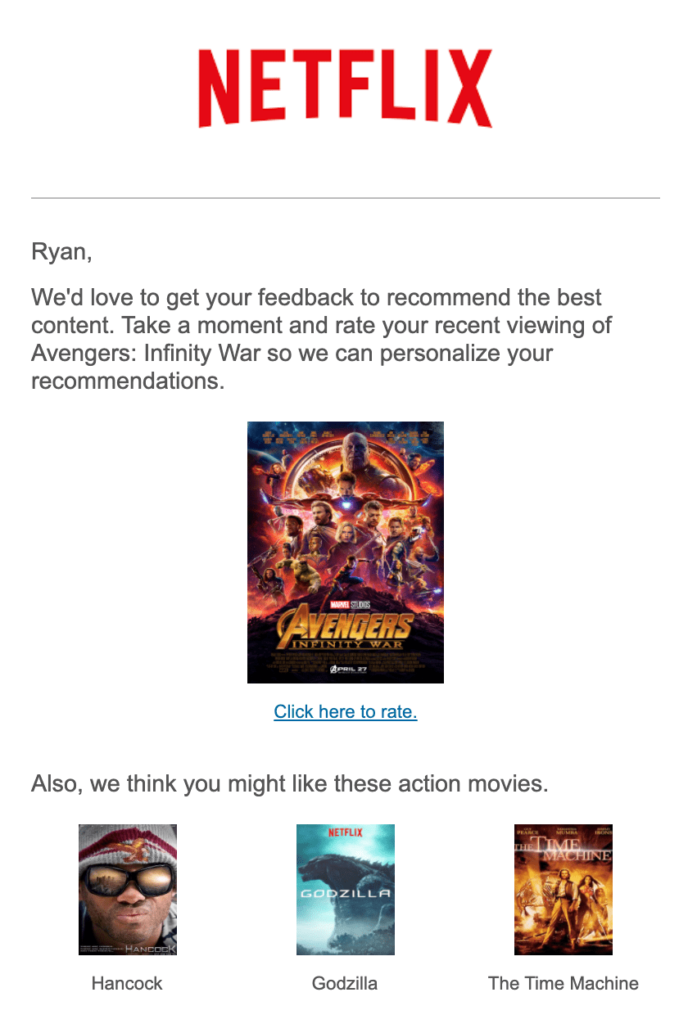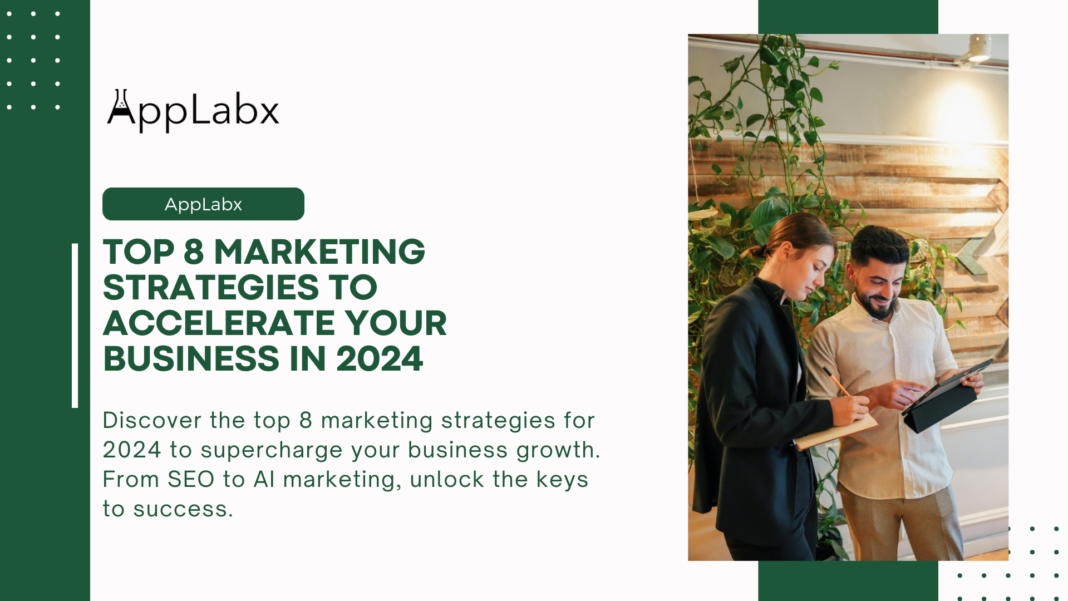Key Takeaways
- SEO Mastery: Mastering SEO techniques is crucial for increasing online visibility and driving organic traffic to your website in 2024.
- Data-Driven Decisions: Harnessing data-driven insights empowers businesses to make informed marketing decisions and optimize campaign performance.
- AI Integration: Integrating artificial intelligence into marketing strategies enables automation, personalization, and enhanced efficiency for accelerated business growth in 2024.
In the dynamic landscape of business, where trends evolve at lightning speed and consumer behaviors shift with every technological advancement, staying ahead of the curve is paramount.
As we stride into 2024, the realm of marketing stands as a beacon of opportunity, offering businesses the means to not only survive but thrive in an ever-competitive market.
In this comprehensive guide, we delve deep into the heart of modern marketing, unveiling the top 8 strategies poised to catapult your business to new heights of success in 2024.
From harnessing the power of content to mastering the intricacies of data-driven decision-making, each strategy is meticulously crafted to align with the pulse of the digital age, ensuring maximum impact and ROI.
As businesses navigate the complexities of today’s market, the need for effective marketing strategies has never been more pronounced.
Whether you’re a budding startup looking to carve out your niche or an established enterprise seeking to reignite growth, the insights and tactics shared in this guide will serve as your roadmap to success.
So, buckle up and prepare to embark on a journey of discovery as we unveil the transformative potential of the top 8 marketing strategies that will shape the business landscape in 2024 and beyond.
From content marketing to influencer collaborations, from SEO mastery to harnessing the power of video, each strategy is a pillar upon which your business can build its foundation for sustained growth and prosperity.
Join us as we unravel the mysteries of modern marketing, empowering you with the knowledge and tools needed to accelerate your business and emerge as a trailblazer in your industry.
The future of your success starts here, with the top 8 marketing strategies poised to revolutionize your business in 2024.
Before we venture further, we like to share who we are and our digital experiences.
About AppLabx
From developing a solid marketing plan to creating compelling content, optimizing for search engines, leveraging social media, and utilizing paid advertising, AppLabx offers a comprehensive suite of digital marketing services designed to drive growth and profitability for your business.
AppLabx is well known for helping companies and startups use Marketing to drive traffic to their websites and web apps.
At AppLabx, we understand that no two businesses are alike. That’s why we take a personalized approach to every project, working closely with our clients to understand their unique needs and goals, and developing customized strategies to help them achieve success.
If you need a digital consultation, then send in an inquiry here.
Top 8 Marketing Strategies to Accelerate Your Business in 2024
- Content Marketing
- Search Engine Optimization (SEO)
- Social Media Marketing
- Influencer Marketing
- Email Marketing
- Video Marketing
- Data-Driven Marketing
- AI Marketing
1. Content Marketing
Content marketing stands as a cornerstone in the modern marketing landscape, offering businesses a powerful avenue to engage with their target audience, build brand authority, and drive meaningful conversions.
In 2024, the importance of strategic content creation is more pronounced than ever, as consumers increasingly seek valuable and relevant content amidst a sea of digital noise.

Importance of Content Marketing in 2024:
- Enhancing Brand Visibility: Strategic content creation allows businesses to increase their online visibility and establish a strong presence across various digital platforms.
- Building Trust and Credibility: By providing valuable and informative content, businesses can position themselves as industry experts, fostering trust and credibility among their target audience.
- Driving Customer Engagement: Compelling content has the power to captivate audiences, sparking meaningful interactions and fostering a sense of community around the brand.
- Boosting SEO Performance: High-quality content that is optimized for search engines can improve organic search rankings, driving more traffic to the business website.
Key Elements of an Effective Content Marketing Strategy:
- Audience Research and Persona Development:
- Conduct comprehensive research to understand the demographics, preferences, and pain points of your target audience.
- Develop detailed buyer personas to tailor content that resonates with specific segments of your audience.
- Content Planning and Strategy Formulation:
- Define clear objectives and goals for your content marketing efforts, whether it’s brand awareness, lead generation, or customer retention.
- Create a content calendar outlining the types of content to be produced, publication frequency, and distribution channels.
- High-Quality Content Creation:
- Produce content that is informative, engaging, and relevant to your target audience’s needs and interests.
- Experiment with various content formats, including articles, blog posts, videos, infographics, podcasts, and interactive quizzes.
- Search Engine Optimization (SEO):
- Conduct keyword research to identify relevant search terms and topics within your industry.
- Optimize on-page elements such as titles, meta descriptions, and headers to improve search engine visibility.
- Prioritize user experience by ensuring content is well-structured, mobile-friendly, and loads quickly.
Examples of Successful Content Marketing Campaigns in 2024:
- Red Bull’s Content Hub:
- Red Bull has long been celebrated for its innovative content marketing strategies, particularly with its Red Bull Media House. Through a diverse range of content, including videos, articles, and events, Red Bull consistently engages its audience while subtly promoting its brand values of adventure and adrenaline-fueled experiences.
- Nike’s “Just Do It” Campaign:
- Nike’s iconic “Just Do It” campaign transcends traditional advertising, leveraging powerful storytelling and inspirational content to connect with consumers on a deeper level. By featuring real-life stories of athletes overcoming challenges and achieving greatness, Nike inspires its audience while reinforcing its brand message of perseverance and excellence.
- HubSpot’s Inbound Marketing Methodology:
- HubSpot’s inbound marketing methodology revolves around creating valuable content that attracts, engages, and delights customers at every stage of the buyer’s journey. By offering a wealth of educational resources, including blog posts, ebooks, and webinars, HubSpot establishes itself as a trusted authority in the realm of marketing and sales software.

In conclusion, content marketing remains a pivotal strategy for businesses looking to thrive in 2024 and beyond.
By prioritizing audience engagement, strategic planning, and high-quality content creation, businesses can leverage the power of content to establish their brand, foster meaningful connections with their audience, and drive sustainable growth.
2. Search Engine Optimization (SEO)
In the digital age, search engine optimization (SEO) remains a cornerstone of online marketing strategies, enabling businesses to enhance their online visibility, attract qualified traffic, and ultimately, drive conversions.
In 2024, the ever-evolving landscape of SEO presents both challenges and opportunities for businesses seeking to achieve prominence in search engine results pages (SERPs).

Importance of SEO in 2024:
- Increased Online Visibility: Effective SEO tactics can propel your website to the top positions in search engine results, significantly increasing visibility and exposure to potential customers.
- Enhanced Credibility and Trust: Websites that rank high in organic search results are often perceived as more credible and trustworthy by users, leading to higher click-through rates and engagement.
- Cost-Effective Marketing: Compared to traditional advertising methods, SEO offers a cost-effective way to attract targeted traffic to your website without incurring hefty advertising expenses.
- Adaptation to Search Engine Algorithms: With search engines constantly updating their algorithms, staying abreast of the latest SEO trends and best practices is essential for maintaining and improving search rankings.
Key Elements of Effective SEO Strategy:
- Keyword Research and Analysis:
- Identify relevant keywords and search terms that align with your business objectives and target audience’s intent.
- Utilize keyword research tools such as Google Keyword Planner, SEMrush, or Ahrefs to discover high-volume keywords with manageable competition.
- Incorporate long-tail keywords and semantic variations to capture more specific search queries and improve relevance.
- On-Page Optimization:
- Optimize meta titles, meta descriptions, and headers to include target keywords and accurately describe the content of each page.
- Ensure that URLs are descriptive, concise, and include relevant keywords where appropriate.
- Create high-quality, informative content that satisfies user intent and provides value to readers.
- Implement schema markup to enhance the visibility of your content in search engine results and enrich snippets with additional information.
- Technical SEO:
- Conduct regular website audits to identify and address technical issues such as broken links, duplicate content, and crawl errors.
- Optimize website speed and performance by minimizing page load times, optimizing images, and leveraging browser caching.
- Ensure mobile-friendliness and responsive design to provide a seamless user experience across all devices.
- Implement HTTPS encryption to secure data transmission and improve trustworthiness in the eyes of search engines and users.
- Off-Page Optimization and Link Building:
- Build a diverse portfolio of high-quality backlinks from authoritative websites within your industry.
- Develop relationships with influencers, bloggers, and industry publications to earn natural backlinks through guest blogging, collaborations, and mentions.
- Monitor and disavow toxic backlinks that could potentially harm your website’s search rankings.
Examples of Successful SEO Strategies in 2024:
- Amazon’s Product Optimization:
- Amazon excels in optimizing product listings to rank prominently in search results within its platform. By strategically incorporating relevant keywords into product titles, bullet points, and descriptions, Amazon maximizes visibility and drives sales for its sellers.
- The Home Depot’s Local SEO:
- The Home Depot leverages local SEO strategies to connect with customers searching for home improvement products and services in specific geographic locations. Through localized content, business listings, and reviews, The Home Depot enhances its presence in local search results and drives foot traffic to its stores.
- Casper’s Content Marketing and SEO Integration:
- Casper, a mattress company, seamlessly integrates content marketing and SEO strategies to attract and engage potential customers. By creating informative and engaging content around topics related to sleep, wellness, and home decor, Casper not only improves its search rankings but also establishes itself as a trusted authority in the industry.

In summary, SEO remains a vital component of any comprehensive digital marketing strategy in 2024.
By adopting a holistic approach to SEO that encompasses keyword research, on-page optimization, technical enhancements, and off-page tactics, businesses can enhance their online visibility, attract qualified traffic, and achieve sustainable growth in the competitive digital landscape.
3. Social Media Marketing
Social media marketing has emerged as a pivotal force in the digital marketing realm, offering businesses unparalleled opportunities to connect with their target audience, build brand awareness, and drive conversions.
In 2024, the landscape of social media continues to evolve, presenting businesses with new avenues for creativity, engagement, and growth.

Importance of Social Media Marketing in 2024:
- Vast Audience Reach: Social media platforms boast billions of active users worldwide, providing businesses with an expansive audience to engage and interact with.
- Brand Visibility and Recognition: Strategic social media marketing efforts can increase brand visibility and recognition, as well as foster a sense of community and loyalty among followers.
- Targeted Advertising Opportunities: Social media platforms offer advanced targeting capabilities, allowing businesses to reach specific demographics, interests, and behaviors with precision.
- Customer Engagement and Feedback: Social media serves as a two-way communication channel, enabling businesses to engage with customers in real-time, gather feedback, and address inquiries or concerns promptly.
Key Strategies for Effective Social Media Marketing:
- Platform Selection and Audience Analysis:
- Identify the social media platforms that align with your target audience demographics, interests, and behaviors.
- Conduct audience analysis to understand the preferences, pain points, and online behavior of your target audience on each platform.
- Prioritize platforms where your audience is most active and engaged to maximize the impact of your social media marketing efforts.
- Compelling Content Creation:
- Develop a content strategy that aligns with your brand identity, values, and goals, while also catering to the preferences of your target audience.
- Create diverse and engaging content formats, including images, videos, infographics, polls, quizzes, and user-generated content.
- Experiment with storytelling techniques, behind-the-scenes glimpses, and interactive elements to captivate and resonate with your audience.
- Community Engagement and Interaction:
- Foster meaningful interactions with your audience by responding promptly to comments, messages, and mentions.
- Encourage user-generated content and actively engage with user-generated posts by liking, commenting, or sharing.
- Host live Q&A sessions, polls, contests, and interactive events to encourage participation and strengthen community ties.
- Data Analysis and Optimization:
- Utilize social media analytics tools to track key performance metrics such as engagement, reach, clicks, and conversions.
- Analyze the effectiveness of your social media marketing campaigns and content initiatives, and adjust strategies based on actionable insights.
- A/B test different ad creatives, messaging, and targeting parameters to optimize campaign performance and maximize ROI.
Examples of Successful Social Media Marketing Campaigns in 2024:
- Airbnb’s #LiveThere Campaign:
- Airbnb’s #LiveThere campaign encourages travelers to experience destinations like a local rather than a tourist. Through captivating visuals, user-generated content, and inspirational stories shared across social media platforms, Airbnb fosters a sense of wanderlust and adventure while promoting its unique accommodations.
- Wendy’s Twitter Roasts:
- Wendy’s is renowned for its witty and engaging presence on Twitter, often engaging in playful banter and humorous exchanges with followers and competitors. By infusing personality and humor into its social media strategy, Wendy’s not only entertains its audience but also strengthens brand affinity and loyalty.
- Lush’s #LushCommunity Campaign:
- Lush’s #LushCommunity campaign celebrates its dedicated fanbase and amplifies user-generated content shared by customers. By showcasing authentic stories, testimonials, and creative expressions from the Lush community, the campaign fosters a sense of belonging and connection while reinforcing brand values of inclusivity and sustainability.

In summary, social media marketing continues to be a driving force in shaping consumer behaviors and preferences in 2024.
By adopting a strategic approach that focuses on platform selection, compelling content creation, community engagement, and data-driven optimization, businesses can leverage social media to forge meaningful connections, foster brand loyalty, and drive business growth in the digital age.
4. Influencer Marketing
Influencer marketing has emerged as a powerful strategy for brands to connect with their target audience in a more authentic and engaging manner.
By partnering with influencers who have established credibility and influence within their respective niches, businesses can amplify their brand message, drive engagement, and ultimately, foster brand loyalty.
In 2024, influencer marketing continues to evolve, presenting businesses with new opportunities to leverage the power of social influence for strategic growth.
Importance of Influencer Marketing in 2024:
- Authenticity and Trust: Influencers have built trust and credibility with their followers, making their recommendations and endorsements more authentic and persuasive.
- Targeted Audience Reach: Influencers have niche-specific audiences that align with the target demographics and interests of brands, allowing for highly targeted marketing campaigns.
- Content Diversity: Influencer partnerships offer access to diverse content formats and creative approaches, enabling brands to showcase their products or services in unique and engaging ways.
- Social Proof and Validation: Endorsements from influencers serve as social proof, validating the quality and value of a brand’s offerings in the eyes of consumers.
Key Strategies for Effective Influencer Marketing:
- Identifying the Right Influencers:
- Conduct thorough research to identify influencers whose values, interests, and audience demographics align with your brand.
- Consider factors such as reach, engagement rate, audience demographics, content quality, and brand alignment when selecting influencers for partnerships.
- Look beyond follower counts and prioritize influencers who have built genuine connections with their audience and demonstrate authenticity.
- Building Authentic Relationships:
- Approach influencer partnerships as collaborations rather than transactions, focusing on building genuine relationships based on mutual trust and respect.
- Invest time in getting to know influencers, their content style, and audience preferences to ensure alignment with your brand values and messaging.
- Provide influencers with creative freedom to authentically integrate your brand into their content in a way that resonates with their audience.
- Setting Clear Goals and Expectations:
- Define clear objectives and key performance indicators (KPIs) for your influencer marketing campaigns, whether it’s brand awareness, engagement, or conversions.
- Communicate expectations, deliverables, and guidelines to influencers upfront to ensure alignment and transparency throughout the partnership.
- Establish a feedback loop to monitor campaign performance, gather insights, and optimize strategies for maximum impact.
- Measuring ROI and Effectiveness:
- Utilize tracking links, promo codes, and unique URLs to attribute traffic, conversions, and sales generated through influencer collaborations.
- Track key metrics such as reach, engagement, impressions, clicks, conversions, and return on investment (ROI) to evaluate the effectiveness of influencer campaigns.
- Leverage social listening tools and sentiment analysis to gauge audience sentiment and perception of your brand before, during, and after influencer partnerships.
Examples of Successful Influencer Marketing Campaigns in 2024:
- Nike’s Collaboration with Athletes and Celebrities:
- Nike has a long history of successful influencer partnerships, collaborating with athletes and celebrities such as Serena Williams, LeBron James, and Cristiano Ronaldo. By leveraging the influence and credibility of these icons, Nike effectively promotes its athletic apparel and footwear while inspiring and empowering its audience to pursue their athletic goals.
- Fashion Nova’s Partnership with Social Media Influencers:
- Fashion Nova, a fast-fashion retailer, strategically partners with social media influencers and celebrities to showcase its trendy clothing and accessories. By featuring influencers of diverse backgrounds, body types, and styles, Fashion Nova fosters inclusivity and authenticity while driving sales and brand awareness among its target audience.
- Sephora’s Beauty Insider Program:
- Sephora’s Beauty Insider program leverages influencer marketing to engage and reward loyal customers while amplifying brand advocacy. By collaborating with beauty influencers to create exclusive content, tutorials, and product recommendations, Sephora enhances its brand credibility and encourages user-generated content from its community of beauty enthusiasts.

In summary, influencer marketing remains a potent strategy for brands seeking to connect with consumers authentically and drive meaningful engagement in 2024.
By partnering with influencers who resonate with their target audience and align with their brand values, businesses can amplify their message, expand their reach, and cultivate lasting relationships with consumers in the digital age.
5. Email Marketing
Email marketing remains one of the most effective and versatile tools in a marketer’s arsenal, offering businesses a direct and personalized way to engage with their audience, nurture leads, and drive conversions.
In 2024, amidst the ever-changing landscape of digital marketing, email continues to be a cornerstone strategy for businesses seeking to build relationships, foster brand loyalty, and achieve measurable results.
Importance of Email Marketing in 2024:
- Direct and Personalized Communication: Email allows businesses to deliver tailored messages directly to the inbox of their audience, fostering a sense of personal connection and relevance.
- Nurturing Customer Relationships: Email marketing enables businesses to engage with customers at every stage of the buyer’s journey, providing value, addressing pain points, and guiding them towards conversion.
- Cost-Effective Marketing Channel: Compared to traditional advertising methods, email marketing offers a high return on investment (ROI) with minimal costs associated with email distribution and automation.
- Data-Driven Insights and Optimization: Email marketing platforms provide valuable insights into subscriber behavior, allowing businesses to track open rates, click-through rates, and conversions, and optimize campaigns accordingly.
Key Strategies for Effective Email Marketing:
- Building a Quality Email List:
- Implement opt-in forms and subscription incentives on your website to encourage visitors to join your email list.
- Segment your email list based on demographics, interests, purchase history, and engagement levels to deliver targeted and relevant content.
- Regularly clean and maintain your email list to remove inactive subscribers and reduce bounce rates.
- Creating Compelling Email Content:
- Craft attention-grabbing subject lines that entice recipients to open your emails.
- Provide valuable and relevant content that addresses the needs, interests, and pain points of your audience.
- Experiment with different content formats, such as newsletters, product updates, promotional offers, and educational resources, to keep subscribers engaged.
- Personalization and Automation:
- Utilize dynamic content and personalization tags to tailor email content based on subscriber preferences, behavior, and demographics.
- Implement automated email workflows, such as welcome series, abandoned cart reminders, and re-engagement campaigns, to nurture leads and streamline communication.
- Leverage behavioral triggers and segmentation criteria to deliver timely and relevant emails that resonate with individual subscribers.
- Optimizing for Mobile and Accessibility:
- Design responsive email templates that render well on various devices and screen sizes, ensuring a seamless user experience for mobile users.
- Optimize email content for accessibility by using clear, concise language, descriptive alt text for images, and accessible formatting for readers with disabilities.
- Test email campaigns across different email clients, browsers, and devices to identify and address any rendering or formatting issues.
Examples of Successful Email Marketing Campaigns in 2024:
- Netflix’s Personalized Recommendations:
- Netflix utilizes data-driven personalization to deliver targeted email recommendations based on each subscriber’s viewing history, preferences, and behavior. By suggesting relevant titles and personalized content, Netflix enhances user engagement and encourages continued subscription.
- Grammarly’s Educational Content Series:
- Grammarly, a writing assistant tool, offers a series of educational email content focused on writing tips, grammar rules, and productivity hacks. By providing value-added content that helps subscribers improve their writing skills, Grammarly reinforces its brand authority and encourages user retention.
- Airbnb’s Travel Inspiration Emails:
- Airbnb sends personalized travel inspiration emails to subscribers based on their browsing history, saved listings, and previous bookings. By showcasing unique destinations, curated experiences, and exclusive offers, Airbnb inspires wanderlust and drives bookings among its audience.

In summary, email marketing remains a cornerstone strategy for businesses seeking to engage with their audience, nurture leads, and drive conversions in 2024.
By implementing effective list-building techniques, creating compelling content, personalizing communication, and optimizing for mobile accessibility, businesses can leverage the power of email to build lasting relationships and achieve measurable results in the digital landscape.
6. Video Marketing
Video marketing has emerged as a dominant force in the digital landscape, offering businesses a dynamic and engaging way to connect with their audience, convey their brand message, and drive meaningful interactions.
In 2024, the rise of video consumption across various online platforms presents businesses with unprecedented opportunities to leverage the power of visual storytelling for strategic growth and impact.
Importance of Video Marketing in 2024:
- Enhanced Engagement and Retention: Video content captures attention and maintains engagement more effectively than text or static imagery, leading to higher viewer retention and interaction rates.
- Improved Brand Recall and Recognition: Visual storytelling through video leaves a lasting impression on viewers, increasing brand recall and recognition long after they’ve watched the content.
- Expanded Reach and Accessibility: With the proliferation of video-sharing platforms and social media channels, businesses can reach a global audience and make their content accessible to diverse demographics.
- Increased Conversion Rates: Video content has been shown to positively impact purchase decisions, with consumers being more likely to make a purchase after watching a product video or testimonial.
Key Strategies for Effective Video Marketing:
- Understanding Your Audience and Objectives:
- Conduct market research to understand the demographics, preferences, and behavior of your target audience.
- Define clear objectives for your video marketing efforts, whether it’s brand awareness, lead generation, product promotion, or customer education.
- Creating Compelling and Shareable Content:
- Develop video content that is informative, entertaining, and emotionally resonant with your audience.
- Experiment with different video formats, including explainer videos, tutorials, product demos, behind-the-scenes footage, testimonials, and storytelling narratives.
- Prioritize quality production values, including professional filming, editing, and audio quality, to enhance the overall viewing experience.
- Optimizing for Search and Discovery:
- Conduct keyword research to identify relevant search terms and topics within your industry.
- Optimize video titles, descriptions, and tags with target keywords to improve visibility and discoverability on video-sharing platforms like YouTube and Vimeo.
- Encourage engagement and interaction by including calls-to-action (CTAs), such as subscribing, liking, commenting, and sharing, within your video content.
- Diversifying Distribution Channels:
- Share your video content across multiple online platforms, including YouTube, Facebook, Instagram, LinkedIn, Twitter, and TikTok, to maximize reach and engagement.
- Tailor your video content to the unique audience demographics and content consumption habits of each platform.
- Utilize paid advertising options, such as YouTube ads, Facebook video ads, and Instagram Story ads, to amplify the reach and impact of your video content.
Examples of Successful Video Marketing Campaigns in 2024:
- Nike’s “Dream Crazier” Campaign:
- Nike’s “Dream Crazier” campaign celebrates the achievements of female athletes and challenges societal norms and stereotypes. Through powerful storytelling and inspirational visuals, Nike’s video ad resonates with viewers on an emotional level while reinforcing the brand’s commitment to empowerment and inclusivity.
- Dollar Shave Club’s Product Demos and Humor:
- Dollar Shave Club’s video marketing strategy revolves around humorous and attention-grabbing product demos and commercials. By infusing humor and personality into their video content, Dollar Shave Club effectively differentiates itself in a crowded market while showcasing the benefits of its grooming products.
- Tasty’s Recipe Videos on Social Media:
- Tasty, a digital food network owned by BuzzFeed, specializes in short, visually appealing recipe videos shared across social media platforms. By delivering quick and easy-to-follow cooking tutorials, Tasty capitalizes on the popularity of food content on social media and drives engagement through likes, shares, and comments.
In summary, video marketing remains a powerful tool for businesses looking to engage with their audience, convey their brand message, and drive meaningful interactions in 2024.
By understanding their audience, creating compelling content, optimizing for search and discovery, and diversifying distribution channels, businesses can harness the full potential of video to achieve their marketing objectives and stand out in a competitive digital landscape.
7. Data-Driven Marketing
Data-driven marketing has revolutionized the way businesses approach their marketing strategies, enabling them to make informed decisions, personalize experiences, and optimize campaigns for maximum impact and ROI.
In 2024, amidst the abundance of data generated by digital interactions, businesses have unprecedented opportunities to leverage data analytics and insights to drive strategic growth and achieve their marketing objectives.
Importance of Data-Driven Marketing in 2024:
- Precision Targeting: Data-driven marketing allows businesses to target specific audience segments with personalized messages and offers, increasing relevance and effectiveness.
- Optimized Customer Experience: By analyzing customer data and behavior, businesses can tailor their marketing efforts to meet the unique needs and preferences of individual customers, leading to improved satisfaction and loyalty.
- Improved Campaign Performance: Data analytics provide valuable insights into campaign performance, allowing businesses to identify trends, patterns, and areas for optimization to achieve better results and ROI.
- Enhanced Decision Making: Data-driven insights empower businesses to make data-backed decisions across all aspects of their marketing strategy, from audience segmentation to content creation to budget allocation.
Key Strategies for Effective Data-Driven Marketing:
- Data Collection and Integration:
- Implement systems and tools for collecting and consolidating data from various sources, including website analytics, customer relationship management (CRM) platforms, social media, email marketing, and transactional data.
- Ensure data accuracy, completeness, and consistency by regularly auditing and cleaning databases and resolving any data quality issues.
- Data Analysis and Segmentation:
- Utilize data analytics tools and techniques to analyze customer behavior, preferences, and interactions across different touchpoints.
- Segment your audience based on demographics, psychographics, purchasing behavior, and engagement levels to deliver targeted and personalized marketing messages.
- Leverage predictive analytics and machine learning algorithms to anticipate customer needs and behavior, enabling proactive marketing strategies.
- Personalization and Customization:
- Implement dynamic content and personalization strategies to deliver tailored experiences to individual customers based on their preferences, purchase history, and lifecycle stage.
- Customize marketing messages, product recommendations, and offers to resonate with each segment of your audience, increasing relevance and engagement.
- Use data-driven insights to optimize the timing, frequency, and channel of communication for each customer, maximizing the effectiveness of your marketing efforts.
- Testing and Optimization:
- Conduct A/B testing and multivariate testing to experiment with different marketing strategies, messaging variations, and creative elements.
- Measure and analyze the results of your tests to identify winning variations and insights that can be applied to future campaigns.
- Continuously iterate and optimize your marketing strategies based on data-driven insights and performance metrics to achieve ongoing improvement and success.
Examples of Successful Data-Driven Marketing Strategies in 2024:
- Amazon’s Recommendation Engine:
- Amazon utilizes sophisticated algorithms and machine learning to analyze customer behavior and purchase history and deliver personalized product recommendations to each user. By leveraging data-driven insights, Amazon enhances the shopping experience and drives additional sales through targeted recommendations.
- Spotify’s Personalized Playlists:
- Spotify curates personalized playlists for each user based on their listening history, preferences, and music taste. By analyzing data on listening habits, genres, and artist preferences, Spotify creates customized playlists that cater to the individual tastes of each subscriber, increasing user engagement and retention.
- Netflix’s Content Recommendations:
- Netflix uses data analytics to analyze viewing behavior and preferences and recommend personalized content to subscribers. By leveraging data on past viewing history, genres, ratings, and user interactions, Netflix enhances the content discovery experience and encourages continued engagement with its platform.

In summary, data-driven marketing remains a cornerstone strategy for businesses seeking to drive strategic growth and achieve marketing success in 2024.
By collecting and analyzing data, segmenting audiences, personalizing experiences, and optimizing campaigns based on insights, businesses can unlock the full potential of data to deliver targeted, relevant, and impactful marketing messages that resonate with their audience and drive measurable results.
8. AI Marketing
AI marketing, powered by advanced machine learning algorithms and data analytics, has emerged as a game-changer in the digital marketing landscape, enabling businesses to streamline processes, personalize experiences, and drive more impactful campaigns.
In 2024, the integration of artificial intelligence into marketing strategies offers businesses unprecedented opportunities to optimize performance, enhance customer engagement, and achieve marketing objectives with greater efficiency and effectiveness.
Importance of AI Marketing in 2024:
- Data Analysis and Insights: AI algorithms can analyze vast amounts of data in real-time, providing actionable insights into customer behavior, preferences, and trends.
- Personalization at Scale: AI enables businesses to deliver personalized experiences to individual customers at scale, increasing relevance and engagement.
- Predictive Analytics: AI-powered predictive analytics can forecast future trends, customer behavior, and campaign performance, enabling businesses to make data-driven decisions and optimize strategies proactively.
- Automation and Efficiency: AI automates repetitive tasks and processes, freeing up marketers’ time to focus on strategy, creativity, and innovation.
Key Applications of AI in Marketing:
- Predictive Analytics:
- Utilize AI algorithms to analyze historical data and predict future trends, customer behavior, and market dynamics.
- Forecast demand, identify emerging opportunities, and anticipate potential challenges to inform strategic decision-making and resource allocation.
- Customer Segmentation and Targeting:
- Leverage AI-powered segmentation techniques to categorize customers into distinct groups based on demographics, behavior, and preferences.
- Tailor marketing messages, offers, and recommendations to each segment to increase relevance and engagement.
- Personalized Content Recommendations:
- Implement AI-driven content recommendation engines to deliver personalized product recommendations, content suggestions, and promotional offers to individual customers.
- Analyze customer interactions and preferences to dynamically adjust content recommendations in real-time, optimizing relevance and conversion rates.
- Chatbots and Virtual Assistants:
- Deploy AI-powered chatbots and virtual assistants to provide instant customer support, answer inquiries, and assist with transactions.
- Utilize natural language processing (NLP) algorithms to understand and respond to customer queries with accuracy and efficiency.
- Optimized Advertising Campaigns:
- Use AI algorithms to optimize advertising campaigns across various channels, including search engines, social media, and display networks.
- Automate bid management, ad placement, and targeting parameters to maximize ad performance and ROI.
Examples of AI Marketing in Action:
- Netflix’s Content Recommendation System:
- Netflix’s recommendation system uses AI algorithms to analyze viewer behavior and preferences and recommend personalized content to each subscriber. By leveraging data on past viewing history, genres, ratings, and user interactions, Netflix enhances the content discovery experience and increases user engagement and retention.
- Amazon’s Product Recommendations:
- Amazon employs AI-powered recommendation engines to suggest personalized product recommendations to shoppers based on their browsing history, purchase behavior, and preferences. By analyzing vast amounts of data, Amazon delivers targeted and relevant product suggestions, increasing sales and customer satisfaction.
- Google’s Smart Bidding:
- Google’s Smart Bidding uses machine learning algorithms to optimize ad campaigns for maximum performance and ROI. By analyzing historical data and real-time signals, Smart Bidding automatically adjusts bidding strategies to achieve advertisers’ goals, such as maximizing conversions or maintaining target return on ad spend (ROAS).
In summary, AI marketing represents a paradigm shift in the way businesses approach marketing strategies, enabling them to leverage data-driven insights, automation, and personalization to drive more impactful campaigns and achieve marketing objectives with greater efficiency and effectiveness.
By embracing AI technologies and integrating them into their marketing strategies, businesses can stay ahead of the curve, adapt to changing market dynamics, and deliver exceptional experiences that resonate with their audience.
Conclusion
Implementing the top 8 marketing strategies outlined above can significantly accelerate your business growth in 2024 and beyond.
Each strategy offers unique opportunities to reach and engage with your target audience, drive conversions, and build a strong brand presence in the competitive digital landscape.
Content Marketing allows you to establish thought leadership, attract organic traffic, and nurture relationships with your audience through valuable and relevant content. By creating informative articles, engaging videos, and interactive experiences, you can position your brand as a trusted authority in your industry.
Search Engine Optimization (SEO) is essential for maximizing your online visibility and driving organic traffic to your website. By optimizing your website and content for relevant keywords, earning high-quality backlinks, and providing a seamless user experience, you can improve your search rankings and attract qualified leads.
Social Media Marketing enables you to connect with your audience on a personal level, foster community engagement, and amplify your brand message across various social platforms. By creating compelling content, engaging with followers, and leveraging social advertising, you can increase brand awareness, drive website traffic, and generate leads.
Influencer Marketing allows you to leverage the credibility and influence of key opinion leaders in your industry to reach new audiences and build trust with potential customers. By partnering with relevant influencers and co-creating authentic content, you can extend your brand reach, drive conversions, and strengthen brand affinity.
Email Marketing remains a powerful tool for nurturing leads, retaining customers, and driving conversions. By delivering personalized and targeted email campaigns, providing valuable content, and leveraging automation, you can engage with your audience at every stage of the customer journey and drive measurable results.
Video Marketing offers a dynamic and engaging way to connect with your audience, tell your brand story, and showcase your products or services. By creating compelling video content, optimizing for search and discovery, and distributing across various platforms, you can captivate your audience’s attention and drive engagement.
Data-Driven Marketing empowers you to make informed decisions, personalize experiences, and optimize campaigns based on actionable insights. By leveraging data analytics, segmentation, and predictive analytics, you can better understand your audience, anticipate their needs, and deliver targeted and relevant marketing messages.
AI Marketing revolutionizes your marketing strategies by harnessing the power of artificial intelligence to automate processes, personalize experiences, and drive more impactful campaigns. By leveraging AI algorithms for predictive analytics, customer segmentation, personalized recommendations, and optimized advertising, you can enhance efficiency, effectiveness, and ROI.
In summary, by incorporating these top marketing strategies into your business strategy for 2024, you can accelerate your growth, expand your reach, and achieve your marketing objectives with greater success.
By staying informed about emerging trends, experimenting with new technologies, and continuously optimizing your strategies, you can stay ahead of the curve and drive sustainable growth in the ever-evolving digital landscape.
If you are looking for a top-class digital marketer, then book a free consultation slot here.
If you find this article useful, why not share it with your friends and business partners, and also leave a nice comment below?
We, at the AppLabx Research Team, strive to bring the latest and most meaningful data, guides, and statistics to your doorstep.
To get access to top-quality guides, click over to the AppLabx Blog.
People also ask
What are the top marketing strategies for accelerating business growth in 2024?
Implement a diverse range of marketing tactics, including SEO, content marketing, social media marketing, and influencer partnerships.
How does SEO contribute to business acceleration in 2024?
SEO enhances online visibility, drives organic traffic, and improves search engine rankings, leading to increased brand exposure and website conversions.
What role does content marketing play in business acceleration?
Content marketing establishes thought leadership, educates audiences, and builds brand credibility, driving engagement and conversions over time.
Why is social media marketing important for business growth in 2024?
Social media marketing allows businesses to connect with their audience, build brand awareness, and foster community engagement, driving traffic and conversions.
How does influencer marketing accelerate business growth?
Influencer marketing leverages the credibility and reach of influencers to expand brand visibility, attract new customers, and drive conversions through authentic recommendations.
What impact does video marketing have on business acceleration?
Video marketing captivates audiences, conveys brand messages effectively, and drives engagement, leading to increased brand recall, website traffic, and conversions.
How does data-driven marketing contribute to business acceleration?
Data-driven marketing enables businesses to make informed decisions, personalize experiences, and optimize campaigns for better performance and ROI, driving accelerated growth.
What is the significance of AI marketing for business acceleration?
AI marketing automates processes, personalizes experiences, and optimizes campaigns based on data-driven insights, enhancing efficiency and effectiveness for accelerated business growth.
How can businesses leverage predictive analytics for growth acceleration?
Predictive analytics forecast future trends, customer behavior, and market dynamics, enabling businesses to anticipate opportunities and challenges and make proactive decisions for growth acceleration.
Why is customer segmentation important for marketing success in 2024?
Customer segmentation allows businesses to tailor marketing messages and offers to specific audience segments, increasing relevance, engagement, and conversion rates for accelerated growth.
What are the benefits of personalization in marketing strategies?
Personalization enhances customer experiences, builds brand loyalty, and drives conversions by delivering tailored messages and offers that resonate with individual preferences and needs.
How can businesses optimize their email marketing for growth acceleration?
Businesses can optimize email marketing by segmenting their audience, personalizing content, and automating workflows to deliver targeted messages and drive engagement and conversions.
What role do chatbots play in enhancing customer experiences?
Chatbots provide instant customer support, answer inquiries, and assist with transactions, improving response times and satisfaction levels for accelerated growth.
How does social media advertising contribute to business acceleration?
Social media advertising allows businesses to reach a highly targeted audience, drive website traffic, and generate leads and conversions through paid promotional campaigns.
What impact do customer reviews and testimonials have on business acceleration?
Customer reviews and testimonials build social proof, credibility, and trust, influencing purchase decisions and driving conversions for accelerated business growth.
How can businesses leverage user-generated content for marketing success?
Businesses can encourage user-generated content, such as reviews, testimonials, and social media posts, to amplify brand visibility, foster community engagement, and drive conversions.
What are the key components of a successful marketing campaign?
A successful marketing campaign involves clear goals, targeted messaging, creative content, strategic distribution, and ongoing optimization based on data-driven insights for maximum impact and ROI.
How can businesses measure the success of their marketing efforts?
Businesses can measure the success of their marketing efforts by tracking key performance indicators (KPIs) such as website traffic, engagement metrics, conversion rates, and return on investment (ROI).
What are the advantages of multi-channel marketing strategies?
Multi-channel marketing strategies allow businesses to reach their audience across various platforms and touchpoints, increasing brand visibility, engagement, and conversions for accelerated growth.
How can businesses stay ahead of marketing trends in 2024?
Businesses can stay ahead of marketing trends by staying informed about industry developments, experimenting with new strategies and technologies, and adapting their approach based on evolving consumer preferences and behaviors.
What role does creativity play in successful marketing campaigns?
Creativity sparks innovation, captures attention, and differentiates brands from competitors, driving memorable experiences and engagement for accelerated growth.
How can businesses leverage data analytics to optimize marketing campaigns?
Businesses can leverage data analytics to analyze customer behavior, track campaign performance, and identify trends and patterns, enabling them to optimize strategies for better results and ROI.
Why is it important for businesses to adapt to changing consumer behaviors?
Adapting to changing consumer behaviors allows businesses to stay relevant, meet evolving needs and preferences, and maintain a competitive edge in the market for accelerated growth.
How can businesses build brand loyalty and advocacy?
Businesses can build brand loyalty and advocacy by delivering exceptional customer experiences, providing value-added content and services, and fostering genuine relationships with their audience.
What are the potential risks of neglecting marketing strategies in 2024?
Neglecting marketing strategies can result in decreased brand visibility, loss of competitive advantage, and missed opportunities for growth and expansion in a rapidly evolving market landscape.
How can businesses optimize their website for better search engine visibility?
Businesses can optimize their website for better search engine visibility by improving site speed, implementing relevant keywords, optimizing meta tags, and creating high-quality, engaging content that resonates with their target audience.
What are the benefits of integrating AI into marketing strategies?
Integrating AI into marketing strategies enables automation, personalization, and optimization of campaigns based on data-driven insights, leading to enhanced efficiency, effectiveness, and accelerated growth.
How can businesses leverage social media platforms to engage with their audience?
Businesses can leverage social media platforms to engage with their audience by sharing valuable content, responding to comments and messages promptly, running interactive campaigns, and fostering community engagement for accelerated growth.
What strategies can businesses implement to improve customer retention?
Businesses can improve customer retention by providing exceptional customer service, offering personalized experiences, rewarding loyalty, and staying in touch with customers through email marketing and social media engagement for accelerated growth.




































